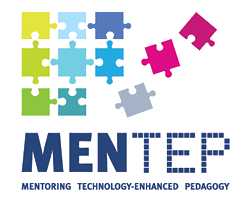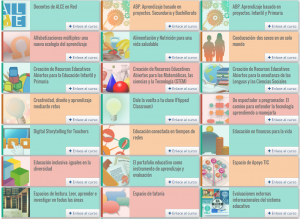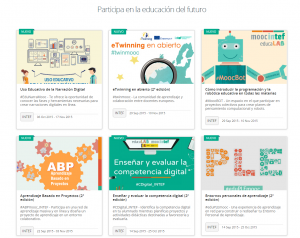INTEF launches the English version of the Common Framework for Digital Competence of Teachers:
Before explaining the reasons why INTEF has decided to translate the Framework into English, it might be convenient to go back in time and walk back the journey that has been made up to now.
Although the reasons for compiling a Common Framework for Digital Competence of Teachers have already been published in this blog in February 2014, after the public presentation of the first draft of the framework, it is important to remember now why this project was launched back in 2012:
Why a Common Framework for Digital Competence of Teachers? Goals
By compiling this Common Framework, the following goals were to be achieved:
- Providing teachers and trainers with a common reference.
- Contributing to higher requirements regarding the digital competence of teachers.
- Having a national list of minimum competencies of teachers.
- Helping teachers to use an adequate itinerary of resources to tackle their tasks, according to their ICT competencies.
- Having availability of levels of performance of teachers.
- Contributing to a methodological change and enabling teachers to develop and assess students’ digital competence.
Having set a clear list of goals from the very beginning, three lines of action are established, on which INTEF has been working over the last four years:
- Line 1: Proposal of the common framework.
- Line 2: Plan of assessment and accreditation of teachers and schools.
- Line 3: Boosting teacher training in digital competence.
Line 1: Proposal of the common framework
How did we get to the Common Framework for Digital Competence of Teachers?
Throughout 2013 a whole line of research and analysis opens and nine frameworks are studied:
- 2 European frameworks (France and European Commision),
- 2 American frameworks (USA and Chile),
- 1 Australian framework,
- 1 Asian framework (Republic of the Philippines),
- 1 Hispanic-American framework (Eurolat) and
- 2 International Frameworks (UNESCO and EPICT).
Several conclusions are drawn from the entire study, among which the fact that there is a range of common points in the analysed frameworks is highlighted: all of them intend to establish standards to define the Digital Competence of Teachers and they all group competencies in areas; most include indicators for assessing capabilities and some refer to the levels of performance of those capabilities.
However, without any doubt, every framework aims at a single goal:
Teacher Professional Development.
Having concluded the search and analysis, INTEF decides to adopt the DIGCOMP Framework by IPTS (EC) and adapt it to the teaching profession, together with the collaboration of representatives of the Autonomous Communities, University experts, teachers and other educational stakeholders, who establish a work group for the elaboration of a Draft of the Common Framework for Digital Competence of Teachers, whose later presentation takes place in a Working Day in Valladolid in February 2014. The feedback collected throughout the aforesaid working day brings out an updated version of the Framework, published in June 2014 and that specifies areas, competencies and improves descriptors of the digital competence of teachers according to levels (Basic, Intermediate, Advanced).
Line 2: Plan of assessment and accreditation of teachers and schools
Within this line of action, it is scheduled to design and later publish an online rubric that fosters the self evaluation of the digital competence of teachers in the context of the shift to a digital school. It is a pilot project that, although not in progress yet, will provide application to some of the five areas of the Framework:
Area 1. Information
Area 2. Communication
Area 3. Content Creation
Area 5. Problem solving
Besides, the Ministry of Education, represented by INTEF, is a partner member of the European Project entitled ’Mentoring Technology Enhances Pedagogy’, MENTEP, an ongoing project up to 2018 with 15 partner countries and coordinated by European Schoolnet, whose aim is analysing and assessing to what extent pedagogy improves when it is put into practice in lessons with the use of technology. The specific areas MENTEP is working with are listed below:
Area 1. Digital Pedagogy
Area 2. Digital Production
Area 3. Digital communication and collaboration
Area 4. Digital Awareness/Citizenship and e-Safety
The outcome MENTEP pursues is creating a sustainable friendly online prototype tool that teachers can use in order to self-evaluate their own progress at ‘Technology-Enhanced Teaching (TET) competence’.
It is then, within this second line of action, and due to our participation in MENTEP, that it becomes necessary to translate the Common Framework for Digital Competence of Teachers by INTEF into English, as it is in English that the European project is developed, and, as indicated below, the similarities between the areas MENTEP is self-evaluating and those the Common Framework by INTEF describes and also intends to self-evaluate are quite many. Actually, the first MOOC MENTEP has launched in September 2015, Introducing Technology-Enhanced Teaching, refers to the Common Framework for Digital Competence of Teachers by INTEF as one of the most developed frameworks at a national level; thus, having an English version also allows us to make the Framework available to any participant in such MOOC and/or to any project partner who might need it, as well as to other international contexts.
Comparing areas within the Common Framework for Digital Competence of Teachers by INTEF and the MENTEP Project:
Area 1. Information = 3. Digital Communication
Area 2. Communication = 3. Digital Communication
Area 3. Content creation = 1. Digital Pedagogy 2. Digital Production
Area 4. Safety= 4. Digital Awareness/Citizenship & e-Safety
Area 5. Problem solving = 1. Digital Pedagogy
(Reference to Framework, between 4:12 and 5:32)
Line 3: Boosting teacher training in digital competence
As regards the third line of action, along the school year, the INTEF Department of Online Teacher Training hosts online training that focuses on developing and improving the digital competence of teachers, mainly by launching two different types of online courses whose target audience are teachers:
- Online Tutored Courses – http://formacion.educalab.es/
- Massive Open Online Courses (MOOC) – http://mooc.educalab.es




















